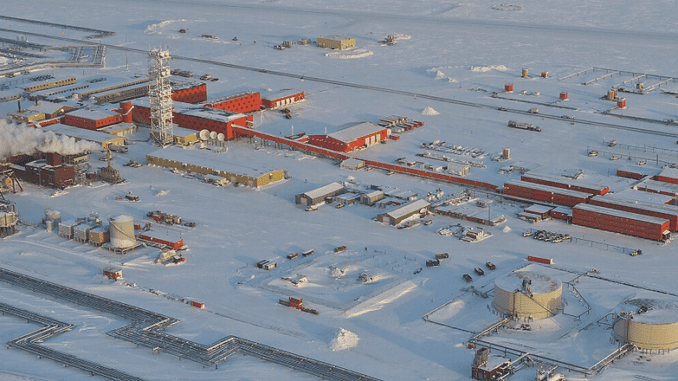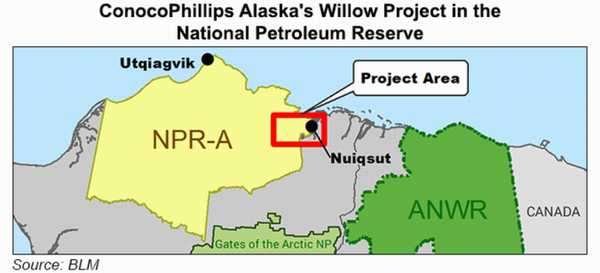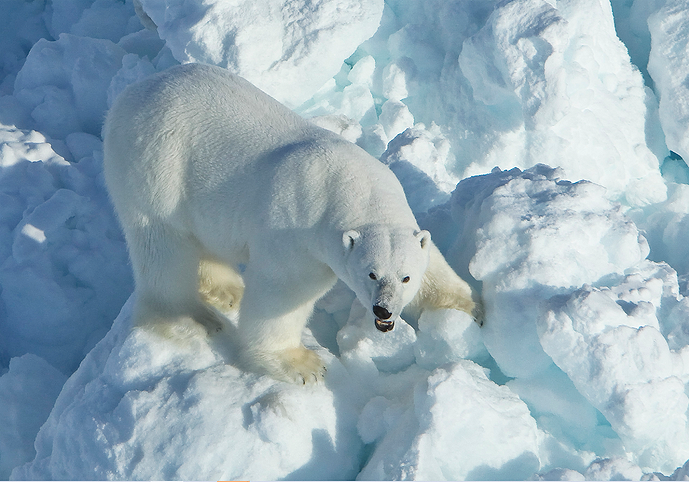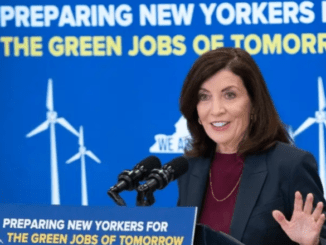
ANCHORAGE, Alaska, March 16, 2023 (ENS) – Warning that the U.S. government’s environmental review fails to account for the full climate impact of oil development in Alaska, five of America’s largest conservation groups have filed a lawsuit to stop ConocoPhillips’ Willow oil project in the National Petroleum Reserve – Alaska, which the Biden Administration approved Monday. In a separate lawsuit, six Alaskan and national conservation and Indigenous groups asserted a similar legal challenge.
Center for Biological Diversity, Defenders of Wildlife, Friends of the Earth, Greenpeace USA, and the Natural Resources Defense Council object to the oil extraction project because it will “add about 260 million metric tons of carbon emissions into the atmosphere over the next 30 years – the equivalent of nearly 70 coal-fired power plants operating for a year.”
The plaintiff groups argue that the project would cause irreparable harm to the environment, Arctic wildlife and nearby people who depend on the land for subsistence.
The lawsuit warns that “additional climate pollution of future” depends on development of the Willow project, and argues that by ignoring the facts the Biden Administration “has failed to assess Willow’s full climate impact.”
The facts that worry the conservationists center on ConocoPhillips’ description of Willow to its investors as the “next great Alaska hub,” saying it had identified a staggering amount of oil, possibly as much as three billion barrels, of nearby prospects that could be accessed if the Willow infrastructure were in place.
On behalf of their more than 10 million members, the five groups argue that opening up this fossil fuel reservoir and burning the 180,000 barrels of oil per day the Willow project is expected to produce at its peak, will intensify climate change and undermine President Joe Biden’s own promises to halve U.S. greenhouse gas emissions by 2030 and transition the country to clean energy.
The Anchorage-based law firm Trustees for Alaska filed a similar legal challenge on behalf of the grassroots group Sovereign Iñupiat for a Living Arctic and five other conservation groups: Alaska Wilderness League, Environment America, Northern Alaska Environmental Center, Sierra Club, and The Wilderness Society.
“The Biden administration released its final decision on the ConocoPhillips Willow project at 5 am Alaska time on Monday, March 13. ConocoPhillips started building an ice road that day – with U.S. Bureau of Land Management permits in hand – and intends to start blasting at a gravel mine on Sunday, March 19. We filed a lawsuit on March 14, charging the Interior Department and multiple agencies with illegally approving Willow,” Trustees for Alaska said in an indignant statement.
“Interior’s decision to give ConocoPhillips permits for this new oil and gas project demonstrates once again how agencies and corporate interests disregard the cost of industrialization to land, water, animals, and people,” Bridget Psarianos, Trustees’ senior staff attorney said, “The Willow project they approved will, without question, reduce access to food and cultural practices for local communities and pump out massive amounts of greenhouse gases that drive continued climate devastation in the Arctic and world.”
ConocoPhillips and other supporters of the drilling argue it will decrease American dependence on foreign energy supplies, create thousands of jobs, and deliver up to $17 billion in new revenue to the federal government, the State of Alaska and North Slope Borough communities.
Supporters of the Willow project include all three members of the Alaska congressional delegation: Senators Lisa Murkowski and Dan Sullivan, both Republicans, and Representative Mary Peltola, a Democrat, as well as the Alaska State Legislature by unanimous vote.
“Producing much-needed American energy in Alaska with the world’s highest environmental standards and lowest emissions enhances the global environment,” Senator Sullivan said just before he expressed his Republican opinion of the conservationists. “In particular, I’d like to commend the Alaskans who live on the North Slope, whose ancestors have inhabited the lands closest to this project for thousands of years, and who bravely spoke out – even as far-left, Lower 48, eco-colonialist NGOs continued their efforts to silence Alaska Native voices.”

The conservationists point out that in approving ConocoPhillips’ Willow project, the Bureau of Land Management is ignoring pleas from 5.6 million people, including leadership from the nearby village of Nuiqsut, asking the federal government to halt the project.
This is the second time the Bureau of Land Management, BLM, has approved the Willow project. The Republican administration of former President Donald Trump first greenlighted the project in 2020.
Conservation and Alaska Indigenous groups challenged that approval in federal court, and the court rejected it as unlawful in 2021. The judge instructed BLM to reassess the project’s full climate impacts and consider alternatives that would lessen its overall impacts.
The plaintiff groups argue that in approving Willow for the second time, the Biden Administration has failed to heed the judge’s instructions, instead producing an environmental analysis that again fails to consider the project’s impacts on climate.
As approved, the project includes three drill sites, gravel roads, a central processing facility, an operations center, an air strip, hundreds of miles of ice roads. It allows drilling and roads in the Teshekpuk Lake special area, one of the most important and sensitive areas in the Arctic.
ConocoPhillips’ operations would have to use chillers to re-freeze thawing permafrost, to make the ground stable enough for drilling to continue.
The Indigenous and Alaskan lawsuit maintains that the Willow project’s effect on the climate of the rapidly warming Arctic directly harms polar bears. “The proportion of females denning on land has increased significantly as sea ice diminishes due to climate change. Polar bears are particularly vulnerable to sea ice melt given their life history and specialized habitat needs. The Southern Beaufort Sea
(SBS) population is among the most imperiled polar bear populations in the world, having declined dramatically since the 1990s,” the groups point out in their court filing.

“The evidence also indicates that oil and gas activities on the North Slope will exacerbate the threat of climate change to SBS polar bears. Noise and visual disturbance from human activity and operation of equipment, especially aircraft and vehicle traffic, have the potential to disturb polar bears nearby. Disturbance of maternal females during the winter denning period can result in premature den abandonment, or earlier den emergences and departures, adversely affecting polar bear cub survival. They are also subject to subsistence hunting and mortality due to interactions with humans where there is a perceived threat to life and property,” according to the court documents.
“Once again, we find ourselves going to court to protect our lives, our communities, and our future,” said Siqiñiq Maupin, executive director of Sovereign Iñupiat. “The Biden administration’s approval of the ConocoPhillips Willow project makes no sense for the health of the Arctic or the planet and comes after numerous calls by local communities for tribal consultation and real recognition of the impacts to land, water, animals, and people.”
Represented by the public interest law firm Earthjustice, the five larger groups also argue in their lawsuit that imperiled polar bears would be harmed by the project, along with other important species. They point out that polar bears are listed as a threatened species under the Endangered Species Act, and the reserve is inhabited by hundreds of thousands of migratory birds, as well as musk oxen, and two caribou herds that calve and migrate through the region and are a vital subsistence resource for Native communities in northern and western Alaska.
ConocoPhillips and Supporters Accentuate the Positive
Houston, Texas-based ConocoPhillips rejoiced over the Biden Administration’s decision and said that in the field the company would start road-building “immediately,” and in the office it “will advance internal approval processes towards a Final Investment Decision.”
ConocoPhillips is Alaska’s largest crude oil producer and largest owner of exploration leases, with 1.6 million net undeveloped acres at year-end 2021.
ConocoPhillips has major ownership interests in two of North America’s largest legacy conventional oil fields, both located on Alaska’s North Slope – Kuparuk, which the company operates, and Prudhoe Bay. Additionally, ConocoPhillips operates the Alpine Field located on the Western North Slope.

“This was the right decision for Alaska and our nation,” said Ryan Lance, ConocoPhillips chairman and chief executive officer. “Willow fits within the Biden Administration’s priorities on environmental and social justice, facilitating the energy transition and enhancing our energy security, all while creating good union jobs and providing benefits to Alaska Native communities.”
After nearly five years of rigorous regulatory and environmental review, the National Environmental Policy Act process is complete. Willow is designed to support and coexist with subsistence activities with many mitigation measures built into the project design, the oil company says.
“We are truly grateful for the steadfast support from Alaska’s Congressional Delegation – Senators Lisa Murkowski and Dan Sullivan, and Representative Mary Peltola – Alaska Native communities, the state legislature and organized labor groups,” Lance said. “We also thank our employees and the contractor community, who dedicated years to designing a project that will provide reliable energy while adhering to the highest environmental standards.”
Alaska Governor Mike Dunleavy, a Republican, welcomes approval of the Willow project, but he’s still not happy. The governor complains that the Biden Administration is frustrating his ambition to open the entire State of Alaska to oil development.
Instead, on Sunday, the day before approval of the Willow project was announced, the Biden Administration said it has plans to ban future oil and gas production in more than 13 million acres in the National Petroleum Reserve – Alaska, as well as 2.8 million acres in the Arctic Ocean near the shore of the reserve.

Governor Dunleavy welcomes the Willow project’s potential economic contributions to Alaska, but points out that it is a project covering just 500 acres.
“It’s disgraceful that the Biden Administration thinks that this is a compromise that will benefit America,” Dunleavy said. “Taking future oil production in Alaska off the map won’t decrease global oil consumption. It will just shift the market and give leverage to producers in countries that don’t have our high standards for the environment and human rights. In the end, every American pays the price when President Biden restricts our ability to develop our own energy resources.”
“Once again the Biden Administration is offering up Alaska as a sacrifice to appease the cult of climate extremism,” raged Alaska Department of Natural Resources Commissioner-Designee John Boyle. “Forestalling development across 16 million acres to atone for an energy project barely 500 acres is emblematic of an environmental fanaticism that should concern all rational people. We Alaskans are left hoping for a future day when federal policy isn’t served with a pitcher of green Kool-Aid.”
The plaintiff conservationists view things differently.
“The science is clear. We cannot afford any new oil or gas projects if we are going to avoid climate catastrophe,” said Natalie Mebane, climate director for Greenpeace USA. “Approving what would be the largest oil extraction project on federal lands is incredibly hypocritical from President Biden who in his State of the Union called the climate crisis an existential threat.”
“Millions of people – from Indigenous groups to former Vice President Al Gore – have come out in opposition to the project. The Department of the Interior has substantial concerns about the Willow project and the harm it could cause to the climate, wildlife, and people,” Mebane said. “This is a make-or-break moment for the President’s climate legacy. He needs to listen to the people, his own departments, and himself when he says we have an obligation to confront the climate crisis. The first step is for him to follow the science and stop approving oil and gas projects.”
Featured image: ConocoPhillips’ Kuparuk oil development operation on Alaska’s North Slope. (Photo courtesy ConocoPhillips)



